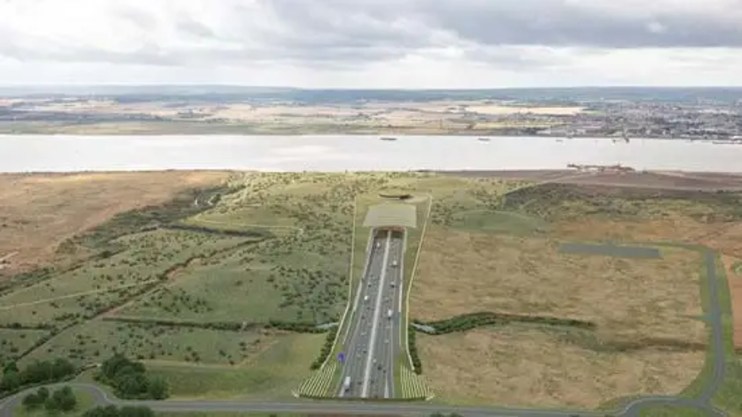Lower Thames Crossing boss: HS2 debacle has driven investors and talent away from UK

Struggles at the embattled High Speed Two line are impacting the UK’s major infrastructure projects and driving some experts overseas, the man leading the delivery of Britain’s largest road tunnel has said.
Plans for the Lower Thames Crossing (LTC) involve building a new 14-mile road and tunnel east of London, linking Kent and Essex.
The £10bn project, one of the biggest in the UK, aims to relieve pressure on the busy Dartford Crossing, freeing up the M25 and improving journeys to and from the Port of Dover.
Matt Palmer, an industry veteran who has worked on Heathrow’s Terminal five and famous third runway proposals, told City A.M. the “biggest impact on LTC and elsewhere is industry morale.”
More secure pipelines, investment and infrastructure systems in other countries such as Saudi Arabia and Canada are now attracting experts overseas, he explained.
Palmer said he had already “lost a lead to Toronto, one of my my tunnel directors has left to go to build a tunnel in Canada. Now, is that directly responsible? He says well I don’t know what’s going on in the UK… safer bet elsewhere, and so we see a brain drain as a result of it.”
The northern leg of HS2 was axed in October amid balooning costs and ongoing delays, while the Euston section connecting the line to Central London is also facing setbacks. The project’s total budget could now reach more than £100bn, up from an initial £33bn.
The government and HS2 Limited has faced fierce political backlash over its handling of the high speed line’s delivery. While inflation has bumped up costs, the project’s business case and decisions including building much of the route in an underground tunnel have been questioned.
One of my my tunnel directors has left to go to build a bloody tunnel in Canada. Now, is HS2 directly responsible? He says, well, I don’t know what’s going on in the UK
“I’ve never known the construction industry in the UK be quite so downbeat about itself, because actually, yes, there’s lots of bad things about HS2, but there’s some really good stuff as well and nobody’s willing to hear that story,” Palmer said.
“Imagine you’ve got I don’t know how many 1000s of people… probably 50 per cent of the construction sector is working on HS2 at the moment and as a country, we’ve just turned our back on it. So yeah as a construction it’s pretty depressing.”
It’s not just HS2. The UK’s infrastructure system is increasingly coming under fire for its excessive planning red tape and long delays, with many projects taking years to get off the ground.

Even Crossrail, the railway construction project responsible for delivering the much-lauded Elizabeth Line, finished £3bn over budget after 20 years of planning.
“It makes Treasury and Central Government very nervous the experience they’ve had, and they would cite it as a sort of Crossrail, followed by HS2. So they’re worried by the historical problems of big programs and you know, it does lead you to… is government set up to do mega projects? You know, that is a good question.”
A Government spokesperson said: “We are removing barriers to investment by speeding up planning approvals, reducing the time it takes for new projects to connect to the grid and we have set out our 10 year forward look of major projects to help build confidence in future investment”.
A spokesperson for HS2 Ltd said: “We’ve been clear about our cost challenges, which have been compounded by significant levels of inflation. HS2 Ltd is now under new leadership and implementing changes across the programme aimed at controlling costs and learning the lessons of the past.”